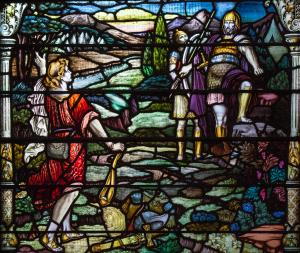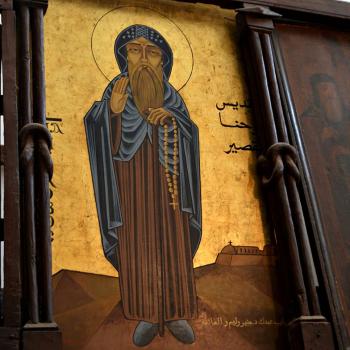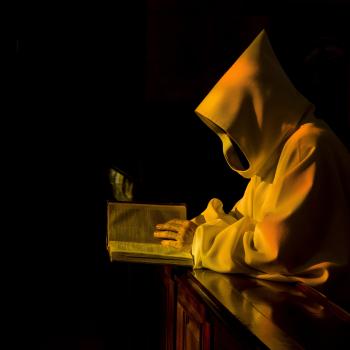
We are so accustomed to believe that those with great power and might cannot be resisted, that even if might does not make right, might makes the way things will be. We are often told that those with little to no power or authority of their own will not be able to resist those who possess more than they, and if they try, not only will they fail, they will make things worse for themselves. While it is true that this is how things often go in the world, they don’t always do so, as we also find there are times when those who are seemingly weak and insignificant prove themselves to not only be able to withstand those who are more powerful than they, but to overcome them, and change the way things are for the better. For, as is often the case, those who have great power and might often become complacent with their power, unable to see that they have weaknesses of their own. And then those, who had been in power, especially if they had treated others poorly with their power, will have to face the consequences of their own actions, sometimes, even, losing their lives.
We can find an example of this in the way Scripture presents to us the victory of David over Goliath: by almost every physical measure, Goliath was David’s superior, and as such, Goliath took it for granted that he could not be and would not be defeated. David, however, knew that Goliath, like everyone else, had his limitations, and was able to exploit them, include Goliath’s pride, which is why Goliath could be and was taken down by David. There are many other examples of this found throughout Scripture, where those who had power and used it to oppress people became so complacent that they lost sight of their weakness, allowing some of those who were being oppressed to discern that weakness and use it to free themselves from their oppression. The story of the Exodus is, of course, a prime example of this, one which also can be and should be seen as an allegory for spiritual oppression and the way we can overcome it. We should keep in mind, therefore, those who appear to be strong are not invincible, and those who appear weak might have a strength in them which will allow them to overcome their oppressors, and that God can and is often find in the midst of those working to free the oppressed. Similarly, then, Scripture constantly warns us to put our focus and faith in God, and not on human might, because all human might in the end has its weakness, which is why the prophet Isaiah warned those who sought refuge and protection from Egypt that Egypt would not be able to help them for long, and that they would suffer humiliation when Egypt found its power taken away from it:
“Woe to the rebellious children,” says the LORD, “who carry out a plan, but not mine; and who make a league, but not of my spirit, that they may add sin to sin; who set out to go down to Egypt, without asking for my counsel, to take refuge in the protection of Pharaoh, and to seek shelter in the shadow of Egypt! Therefore shall the protection of Pharaoh turn to your shame, and the shelter in the shadow of Egypt to your humiliation. For though his officials are at Zoan and his envoys reach Hanes, every one comes to shame through a people that cannot profit them, that brings neither help nor profit, but shame and disgrace.” (Isa. 30:1-5 RSV).
Many thought they could rely upon Egypt for protection, but the reality is that Egypt’s might was not as it had been in the past; Egypt was not going to be able to defend itself, let alone the people of Israel. Trusting in Egypt was foolhardy, especially as God had consistently warned Israel not to do so. The prophets constantly said they should heed God and God’s ways if they wanted to be saved from the violence which was spreading throughout the world. For it was not through their own might that Israel had been established, but rather, the reverse, as those who were seemingly powerless, former slaves with no land of their own, came to their place in the world through the direction and guidance of God: “for not by their own sword did they win the land, nor did their own arm give them victory; but thy right hand, and thy arm, and the light of thy countenance; for thou didst delight in them (Ps. 44:3 RSV).
This, sadly, is something which humanity, including those who seek after God and God’s ways, have had to learn time and time again throughout history, Despite the way the greatest victory of all, Christ’s victory over death, showed the power which can be manifest in and through accepting such weakness, Christians sadly have turned to the way of the fallen world and the way of worldly might. And while, for a time, such might seems to come up on top, it can and will never last, and eventually those who rely upon it will be put to shame by those who appear and are much weaker than they. Thus, we read, that when Abba Poemen tried to find a way to reconcile a conflict between two villages by having the more powerful village make peace, after it was clear the powerful village would not, that village suffered humiliation and defeat, revealing once again the way of God’s justice in the world:
Two villages had a dispute with each other in Egypt. Father Poemen went and begged the larger and more powerful village to make peace with the smaller village, but they did not wish to heed him. So he shook the dust of his feet over them and they went to war with each other. The men of the large village were routed and defeated, because the Lord provides justice to the deprived.[1]
While war is always a defeat for humanity, we must keep in mind those who invade other countries, lands which they think are weak, are those who are most culpable for what happens. Those who stand up and defend themselves, even if it appears they are weak and cannot win, should still be given all the help and support that can justly be given them, for often, those who are said to be unable to win will be those who stand their ground and overcome oppression. For, as Scripture shows, the apparently impossible can and often happens, and when it does, God is often at work, making sure that those who are culpable for great evils suffer the consequences of their actions.
[1] More Sayings of the Desert Fathers. An English Translation And Notes. Ed. John Wortley (Cambridge: Cambridge University Press, 2019; repr. 2023), 103 [“Sayings Preserved in Armenian”: A29].
Stay in touch! Like A Little Bit of Nothing on Facebook.
If you liked what you read, please consider sharing it with your friends and family!
N.B.: While I read comments to moderate them, I rarely respond to them. If I don’t respond to your comment directly, don’t assume I am unthankful for it. I appreciate it. But I want readers to feel free to ask questions, and hopefully, dialogue with each other. I have shared what I wanted to say, though some responses will get a brief reply by me, or, if I find it interesting and something I can engage fully, as the foundation for another post. I have had many posts inspired or improved upon thanks to my readers.















